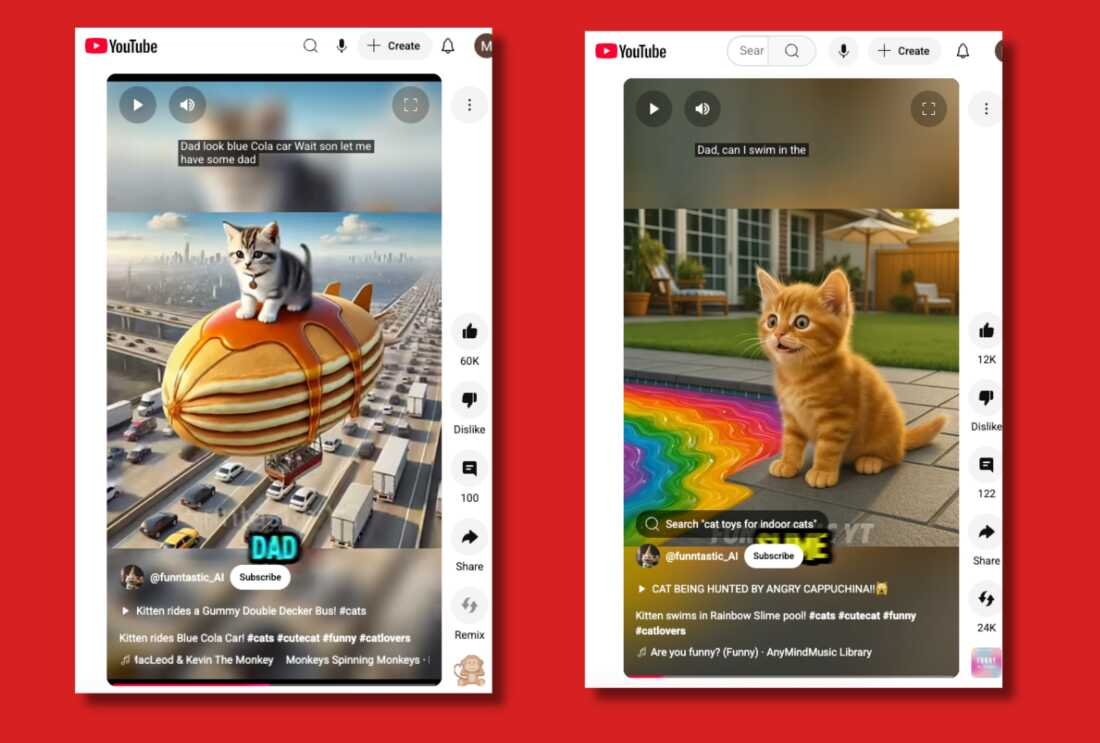-
AI slop floods feeds but lacks soul
-
70% of consumers prefer human-made content
-
Authentic voices build trust & resonance
-
Human flaws > AI perfection for connection
-
Brands win with personality-driven storytelling
The value of human-centric creator content in the era of AI

The marketing world is drowning in what industry insiders have started calling "AI slop", which is low-cost, high-volume content generated by artificial intelligence.
But brands rushing to capitalize on AI's speed and cost-efficiency are missing a critical insight: audiences actually crave the opposite. According to Ipsos Consumer Tracker, about three in four Americans want humans to create news and entertainment content, while two in three prefer human-made marketing and art content.

“What captivated people centuries ago still captivates us today,” said Sarah Levinger, Founder at Tether Insights. “We’re wired to seek out awe and amazement (those little moments that break up the tedium, frustration, and sorrow that make up so much of life.) At our core, we’re just brains trying to make sense of the chaos. Unlike the flat, forgettable output of AI slop, personality-driven content feels alive, human, and worth remembering.”
While most brands race toward AI automation, a counterintuitive opportunity is emerging: the companies doubling down on human expertise are capturing the audiences everyone else is losing.
What Is AI Slop and Why Is It Everywhere?
AI slop is the commoditization of content creation. The endless stream of generic blog posts, social media captions, and marketing copy generated by AI tools like ChatGPT, Claude, and Gemini.
This content is technically correct and informative, but often emotionally hollow, lacking genuine insight, and while infinitely scalable, forgettable.
The global AI-powered content creation market reached $2.15 billion in 2024 and is projected to hit $10.59 billion by 2033. And while 85% of marketers believe generative AI will transform content creation, 75% already use AI tools to assist in creating or editing marketing videos. What’s more: 67% of small businesses now use AI for content marketing and SEO, and 58% of marketers intend to incorporate AI for content creation activities.
The appeal of AI for brands is obvious. AI can generate dozens of blog posts, social media graphics, and video scripts in the time it takes to brief a human creator. For resource-strapped marketing teams under pressure to produce more content faster, AI seems like the dream solution.
But this race to the bottom has consequences.
As Joe Lazer, publisher of "The Storytelling Edge" newsletter, notes creator economy, “Tech people often overhype AI because they conflate the act of writing with the art of storytelling.” The result is a digital landscape saturated with content that checks all the technical boxes while failing to create a genuine connection.
The Human Advantage: What AI Can't Replicate
There’s a fundamental difference between AI-generated content and personality-driven human content. Its origin. Human-centric content comes from lived experience, carries an authentic perspective, and reflects genuine expertise that can't be programmed.
“Every brand wants attention. But people follow people….not brands,” said Mitchell Cohen, Content Strategist at App Sumo.
The online gaming industry has also recently figured out what every industry already knew. For years, online gaming marketing followed the same playbook: blast people with ads, make big promises, and hope something sticks.
Instead of relying on rehearsed scripts, real individuals who understand the games capture the true, candid experience of online gaming. We trust people who've walked the walk, not just talked the talk. That's what makes human stories stick.
Cody Wittick, founder of Kynship, predicts this trend will only intensify: “Content with slight inconsistencies, authentic personality, even occasional flaws will perform increasingly well because people will know it wasn't AI.”
Here are some of the key differentiators:
|
Capability |
AI Content Creation |
Human-Centric Content Creation |
|
Speed & Scale |
Can generate dozens of pieces in minutes; infinite scalability |
Requires time for research, creation, and refinement |
|
Emotional Resonance |
Lacks depth. Can mimic emotion, but cannot genuinely feel or relate |
Creates genuine emotional bonds through shared experience |
|
Cultural Context |
Misses cultural nuances, current events, and social subtleties |
Grasps cultural moments, trends, and unspoken social dynamics |
|
Original Insights |
Recombines existing information without true innovation |
Breakthrough thinking. Generates novel ideas from lived experience and expertise |
|
Audience Trust |
Skepticism growing. 70% of consumers prefer human-created content |
High trust. Audiences connect with real people and authentic voices |
|
Personal Experience |
No lived experience. Cannot draw from personal trials, failures, or victories |
Shares real struggles, lessons learned, and genuine transformations |
|
Adaptability |
Struggles with unexpected situations or nuanced requests |
Highly adaptable. Can pivot based on audience reaction and real-time feedback |
|
Expertise Depth |
Broad but shallow. Has access to information but lacks specialized depth |
Years of experience create nuanced, expert-level insights |
|
Creative Innovation |
Excels at pattern recognition but struggles with true creativity |
Human imagination creates breakthrough concepts and approaches |
|
Crisis Management |
Lacks judgment. Cannot navigate sensitive situations or read social cues |
Emotional intelligence to handle delicate situations with empathy and wisdom |
Original research and insights
Human creators conduct primary research, interview industry experts, and uncover insights that AI can't access. Unlike AI tools that summarize existing information, humans create new knowledge.
Authentic point of view
Personality-driven content carries the creator's unique perspective. The content is shaped by their experiences, expertise, and failures. It’s a distinct voice that audiences can recognize and trust.
These spontaneous, deeply human moments are where real connection happens, and they're impossible to program or predict.
Contextual understanding
Humans understand nuance, cultural references, and the unspoken implications that AI misses.
For instance, AI can explain “sustainable fashion,” but only human creators recognize their audience's real concern isn't the environment; it's looking stylish without admitting they can't afford fast fashion anymore.
Emotional resonance
Human creators understand that marketing at its heart, is about creating emotional connections that drive decision-making.
A study performed by Nobel Prize-winning psychologist Daniel Kahneman indicated that emotions contribute around 90% to our decisions, while logic only factors in for around 10%.
Product in context
Rather than listing features, human creators show how products fit into real lives and solve actual problems in relatable scenarios.
When creator Emma Chamberlain partnered with Dove on their line of plant milk-based body washes, it lent more authenticity to the campaign because her audience already knows about her personal interest in plant-based milk for coffee.

Further reading: Top YouTube Gamers You Should Be Following
The Performance Gap: Data That Proves Human Connection
Personality-driven content consistently outperforms generic alternatives across key metrics that matter to executives: engagement rates, conversion rates, and brand recall.
The creator economy's explosive growth validates this. Individual creators are building media empires that rival traditional publishers. And, they’re not doing it with superior production budgets or distribution networks. Their differentiator? Authentic connection with audiences.
Industry observers note that “power has shifted from legacy companies to 'creators'—an umbrella term encompassing podcasters, streamers, TikTokers, and Substackers who have built robust, personality-driven media businesses.
And, while macro-influencers with millions of followers can carry a marketing campaign a long way, don’t ignore micro-influencer marketing. With smaller yet highly engaged audiences, they have proven to be just as effective, if not more so.
When given the choice, audiences gravitate toward content from someone they feel they know. That’s a real competitive advantage AI can’t replicate, regardless of how sophisticated the technology becomes.
Brands Getting Human-Centric Content Right
Smart brands are restructuring their content strategies around human expertise and personality. Rather than viewing creators as expensive alternatives to AI, they're treating them as strategic assets that can't be commoditized.
Which brands are doing this well? Consider these standout examples:
Huckberry
Huckberry's character-driven storytelling strategy centers on "finding engaging characters doing interesting and inspiring things" - what their Chief Brand Officer calls "our version of Dirty Jobs." They feature real people like pro surfer Dean Petty learning new skills, from fixing Toyota truck engines to crafting wood surfboards.
Their "Shop Class" series chronicles Petty's journey to learn skills by "tracking down the best people who do it and asking a lot of questions." They also fund pro surfer Dylan Graves' personal YouTube channel, getting "brand halo" while adventures live on his channel.

Co-founder Richard Greiner explained their philosophy: "We make decisions all the time, that if you were an e-commerce guru, you'd hate Huckberry. We're trying to get people's mind share instead of wallet share."
Graza
Graza’s social media strategy is delightfully unhinged in that it doesn’t take itself too seriously.
A recent tweet reads “idk 'bout you, but we're feelin '22 and also feel like launching January 11th soooo”. In another, we see people (presumably employees) dressed up like life-sized Graza olive oil bottles, chest bumping each other.
In the sea of beige that social media sometimes feels like nowadays, Graza is playful, human, and so refreshingly real.
Making Human-Centric Content Work
For marketing leaders ready to differentiate their brands through personality-driven content, several strategic approaches have proven effective:
Lead with personal narrative
As Fractional CMO Joe Lazer says, “Your job isn't to transmit information by stringing words together. Your job is to build trust with your audience and make them care that what they're reading, watching, or listening to comes from you.”
This means leading with stories from your company's journey: the failures that taught you something, the customer conversation that changed your product direction, the moment your founder realized they were solving the wrong problem.
Hire people who actually want to be on camera
Stop looking for "content creators" and start hiring people who genuinely enjoy sharing their expertise. Find the product manager who lights up when explaining how something works, or the customer success rep who naturally tells great client stories. Give them the tools and training to turn that authentic enthusiasm into content.
Think like a media company, not a marketing department
You can own the social accounts, platforms, strategic playbooks, and content libraries while allowing individual creators to come and go. This allows you to leverage their creativity while ensuring brand continuity.
Focus and differentiate
Identify one or two areas where you can truly win. Instead of spreading thin across every platform, dominate LinkedIn thought leadership or become the definitive TikTok voice for your industry niche.
Incentivize authentic partnerships
For external creator relationships, move beyond transactional partnerships toward revenue-sharing models, exclusive brand deals, or access to premium experiences that align with their personal brand.
For example, MrBeast gives creators equity in Feastables. Patagonia offers ambassadors profit-sharing on products they help develop. Sephora's creator incubator provides business mentorship. Find ways to make the partnership's benefits flow in both directions.
Go deep on expertise
Identify your most defensible content areas and enhance them with elements AI can't replicate. Original research, expert interviews, behind-the-scenes access, or proprietary data add unique value.
The key insight here is that personality-driven content is about being strategically human in ways that create sustainable competitive advantages.
The Future: Beyond the AI Hype
The future belongs to brands that understand storytelling as a strategic capability.
As AI capabilities continue to advance, the brands that win will be the ones that recognize where human expertise and authentic connection create irreplaceable value.
Generic content doesn’t stand a chance against authentic storytelling that only you can tell. In a sea of AI slop, personality-driven content is a premium offering that audiences actively seek out and remember.
While competitors are still chasing AI productivity gains, marketing leaders who recognize this shift will build the authentic connections and brand differentiation that drive long-term growth.
Will AI get better at writing? Video quality? Image generation? Those are the wrong questions we’re chasing. But will your brand get better at being human? That’s the question to ask yourself.
The Largest Creator Agency in the World
Elevate your brand’s influence with award-winning, always-on marketing services.




